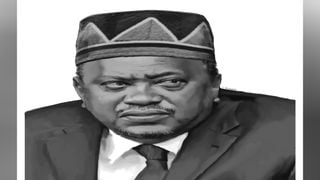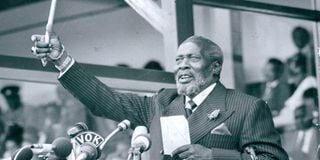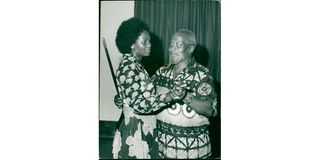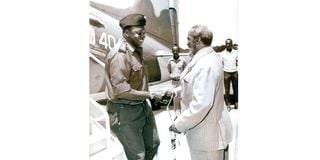
Like them or hate them, the Kenyattas have been a political powerhouse. They are revered and hated in equal measure.
| Nation Media GroupWeekly Review
Premium
45 years after Jomo's death… the Kenyattas are under siege
What you need to know:
- The Kenyattas are revered and hated in equal measure. They have had seasons of triumph and seasons of defeat.
- They have been humiliated, written off, and dismissed — only to come back. Will they survive the Ruto onslaught?
In the 1960s, in a fit of fury, colonial chief Njiri Karanja was so furious about Jomo Kenyatta’s release from jail that he took an axe and smashed the radio that made the announcement.
But Jomo went on to become the President of Kenya as Njiri – who always hoisted the Union Jack at his home – watched in despair.
Like them or hate them, the Kenyattas have been a political powerhouse. They are revered and hated in equal measure.
They have had seasons of triumph and seasons of defeat. They have been humiliated, written off, and dismissed – only to come back. They are unquestionably rich – with contested wealth. They have been easy political targets and fall guys. They have also been bullies.
When former President Uhuru Kenyatta recently called a press conference – it was clear that the family was, once again, under siege.
Personally, the former President was about to lose the Jubilee Party, an outfit that had won him the presidency twice, to some political upstarts sponsored by the government.
How far Uhuru will fight his former Deputy is not clear. But having lost the Mt Kenya platform illustrated how the family’s hold on central Kenyatta politics was undergoing severe tests. Cornered, the family either fights back or coils into oblivion.
For the last 94 years, ever since Jomo Kenyatta sailed to Europe as Johnstone Kenyatta, the family’s name was engraved in Kenya’s colonial and post-colonial history.
The British were frightened by his departure and had tried to dissuade the Kikuyu Central Association from sending him as their envoy to London. He persisted and soon became the face of the liberation struggle. By 1961, the release Kenyatta campaign was the rallying call in the country.
That the 90-year-old Jomo Kenyatta’s wife, Mama Ngina, could have her security withdrawn is an indicator of how far the family power is going through the test. While former President Uhuru Kenyatta has been accused – without evidence – of financing the recent wave of demonstrations.

Former President Mzee Jomo Kenyatta.
Uhuru’s son John Kenyatta was in the news over his licensed guns. The Kenyattas have all been caught up in the ongoing political battles between President Ruto and opposition leader Raila Odinga.
It is not the first time that the Kenyatta family has been accused of sponsoring uprisings. In the 1940s and early 1950s, Jomo Kenyatta was accused of sparking the nationalist wave through his Kenya African Union.
Jomo’s return to Kenya from Europe had reinvigorated the spirit of nationalism -much to the chagrin of the colonial government.
Despite the denial, he would later be accused of being the leader of the Mau Mau movement and jailed for seven years and further restriction.
“The government had done its best to erase the memory of Kenyatta from Kikuyuland. His college at Githunguri had been destroyed, his home in Gatundu pulled down and his farm given over to an agricultural college. For years his old Hudson car was left rotting in the bushes,” wrote Jeremy Murray-Brown, the Kenyatta biographer.
During this period, the British colonial government ran an anti-Kenyatta campaign in central Kenya, with governor Sir Patrick Reninson dismissing him as “leader unto darkness and death.”
His supporters in the Mt Kenya region were told that Kenyatta would never be back.
That radio promise would annoy Chief Njiri after learning that Kenyatta was set to return. Ironically, Chief Njiri’s son, Kariuki, had to vacate his Legislative Council seat in 1961 to allow Kenyatta to enter the assembly.
Today, a similar hate campaign has been waged on the Kenyattas over their wealth. Much of the discord was over the fate of Mau Mau veterans who never got land after independence.

President Kenyatta and Mama Ngina during New Year celebrations in the 1970s at State House, Mombasa
Kenyatta’s presidency from 1964 to 1978 has always been used for or against the family, for allowing the political elite to amass lots of wealth at the expense of the poor – through the Z-Plot scheme.
In this scheme, the Kenyatta government allowed most elites to get at least 100 acres of land with a farmhouse.
The Kenyatta-era elite, plus the Kenyatta family, also took advantage of the willing-buyer willing-seller policy to get the best ranches, tea, coffee, and sisal plantations in the country.
It was this acquisition of property that tarnished Kenyatta’s image. In the mid-1970s, Western media attacked “The Family”, with Newsweek arguing that it was “widely unpopular for the wealth and power it has acquired through unabashed nepotism”.
More so, in 1975, the Sunday Times of London wrote a series of articles attacking the Kenyatta family and tracing their fortune to the use of presidential power to circumvent legal and administrative obstacles.
But some historians say Kenyatta was not in charge after the 1966 stroke, and as Duncan Ndegwa, an insider in the Kenyatta regime, later wrote, “he never wholly recovered the energy and stamina of his robust past…Head of State was weak, frail and faint…it was a struggle through and through.”
In his recent book on Kenyatta’s presidency, University of Delaware historian, Wunyabari Maloba argues that the decline in Kenyatta’s health led to the family’s “aggressive drive to accumulate as much wealth as possible in a relatively short period of time.”
It is this wealth that has always haunted the Kenyatta family – and used against them.
In the run-up to the last elections, the Ruto campaign took advantage of the unresolved land issues in central Kenya by pointing to the wealth that the Kenyatta family had.

Uganda’s President Idi Amin (left) meets President Jomo Kenyatta at the airport in Mombasa in 1970s.
It was a burden that Uhuru Kenyatta had to carry as he campaigned for Raila Odinga. The two were accused of trying to entrench a “dynasty” since Raila’s father was Kenyatta’s Vice President.
The hate campaign against the Kenyatta family was mainly resurrected in the Mt Kenya region, where Dr Ruto played the victim card, used the church platform, and galvanized the subalterns to support his “bottom-up” campaign.
He blamed the Uhuru Kenyatta government, where he was ironically the Deputy, for running down the economy by taking more debts than the country could pay.
Though Uhuru blamed his former Deputy for abandoning him, much of the anti-Uhuru propaganda was tied to the truce he entered with Raila Odinga after the 2017 election.
It is the soiled relationship with Uhuru that saw the government withdraw former First Mama Ngina’s security and send police officers to get guns from Uhuru’s son. Before that, the family’s land in Ruiru had been attacked by goons a few days after Kikuyu MP Kimani Ichungw’ah said the Kenyatta family’s land would not be safe.
The goons took off with sheep, and the local police did not intervene. The excuse was that they were busy combating riots and protecting properties at the city center.
Mama Ngina has also been attacked on the political podium over taxes, while Uhuru was also accused of using his position as President to give a waiver to NCBA bank amounting to Sh350 million.
This waiver was accorded during the merger of NIC and CBA Bank in 2016. The latter was a bank associated with Kenyatta Family.
More so, their milk company has always been targeted by politicians and has had its license to import power milk from Uganda withdrawn.
How far the Kenyattas will fight back is not clear. With Uhuru stating that he will stand by Odinga, the battle lines appear drawn as the past is brought to inform the present.
Twitter: @johnkamau1





